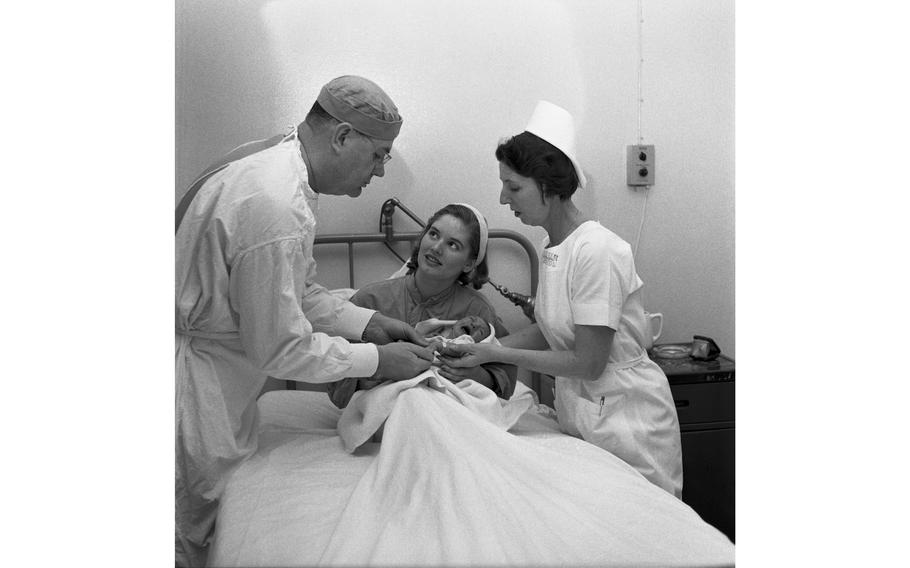
Col. Harold E. Harrison and Chief Nurse Maj. Ruth Steenburgh visit with a new mother and her baby at the 97th U.S. Army Hospital in Frankfurt. (Gene Bane/Stars and Stripes)
This article first appeared in the Stars and Stripes Europe edition, Jan. 11, 1957. It is republished unedited in its original form.
About 15,000 American babies will be born at Army hospitals in France and Germany during 1957, says Col. Harold E. Harrison, USAREUR consultant in obstetrics and gynecology and chief of that service at the U.S. Army Hospital in Frankfurt.
Of the expected number of USAREUR babies slated for 1957, Harrison says 225 infants per month will be born at the U.S. Army Hospital in Frankfurt. Last year, the average number of births at the hospital was little more than 200 babies per month for an annual total of 2,408 deliveries.
In 1952, according to Harrison, births at the Frankfurt Army Hospital averaged 76 per month. If statistics mean anything, the expected USAREUR births this year will be more than the combined total births were in Nevada and Vermont in 1952.
The Army is well prepared to care for mothers and babies. At the hospital in Frankfurt, for example, the obstetrics ward is equipped with 73 beds, and 62 bassinets.
This number may have seemed high in 1952, when in the month of April only 60 babies were born, but December 1956 saw a record high in births with 248 deliveries bringing 255 babies including seven sets of twins into the world.
The highest number of births, for any one day recorded at the Frankfurt hospital was on Dec. 30, 1956, when 14 infants were born.
Perhaps to the layman, the birth of a baby is regarded with a certain amount of awe as one of nature’s rare wonders. But to trained and able men like Harrison and his highly qualified staff of obstetricians, pediatricians and medical technicians, there is no mystery to birth. It is, rather, a well understood science.
From the moment that pregnancy is established until six weeks after birth, Army wives in USAREUR can be sure of obstetrical care equaling the best offered at any Stateside hospital.
From her first prenatal check to her final postnatal examination, the Army mother and her newborn baby receive at an average total cost of $10 per birth the type of care and treatment that would cost at least $250 to a Stateside civilian family.
The nine months of pregnancy are divided into three parts, says Harrison. The first three months is the critical period. It is at this time that the embryo forms within the mother. The greatest danger at this period is illness to the mother. German measles, polio, and many other types of virus diseases can seriously affect the birth of the child.
Following their initial pregnancy diagnosis at their local dispensary, all Army mothers are expected to visit the Army hospital in their area during the first weeks of their pregnancy for an evaluation check.
After the hospital examination the prospective mother is remanded to the expert care of her local dispensary doctor. She is given a booklet of instructions advising her of the necessary precautions to take during the entire period of her pregnancy.
From the fourth to the eighth month of pregnancy, the prospective mother is seen by an Army doctor at least once each month. During the last four weeks of pregnancy, the mother must report to her doctor once a week.
At this period a determination is made as to the probable date of birth. If the woman lives a great distance from the hospital, she is advised to report there between 10 days and two weeks before the expected birth.
Generally the actual birth is treated as a routine and very natural situation. Regardless of the time of day or night, a qualified obstetrician is on duty at each of the USAREUR hospitals to aid the mother in her delivery.
Immediately following the birth, a plastic name tag is placed on the baby and the mother. For the first 24 hours after the birth, the infant is kept in a nursery where trained nurses and technicians care for it. Harrison said the first 24 hours are the most crucial in a baby’s life. It is at this time usually that complications of any sort would make themselves known. After this crucial period the baby is kept with the mother for her five to six day stay at the hospital.
In the field of obstetrics, premature births still remain a great challenge to doctors. During 1956 in USAREUR, about one out of every 33 births was premature. Obstetricians are agreed on one cause of prematurity, Harrison says, and that is if the mother puts on too much weight.
Harrison can recall women who gained between 75-100 pounds during their pregnancy. One case he will never forget is that of the woman who weighed 300 pounds at the time she gave birth.
Ideally, a woman should gain two to three pounds during her first three months of pregnancy and between eight to 10 pounds each in her next two pregnancy periods. During the nine months the ideal gain is approximately 20 pounds.
Fathers are not forgotten by the Army hospitals. At the maternity ward in the Frankfurt Hospital, an anteroom is available where prospective fathers may wait it out. But Harrison prefers that fathers bring their wives to the hospital, leave their phone numbers and then return to their homes.
Most fathers, says Harrison, especially if it is their first experience, get jittery when their wives are due. But, adds Harrison, “we’ve never lost a father yet.”
Looking for Stars and Stripes’ historic coverage? Subscribe to Stars and Stripes’ historic newspaper archive! We have digitized our 1948-1999 European and Pacific editions, as well as several of our WWII editions and made them available online through https://starsandstripes.newspaperarchive.com/